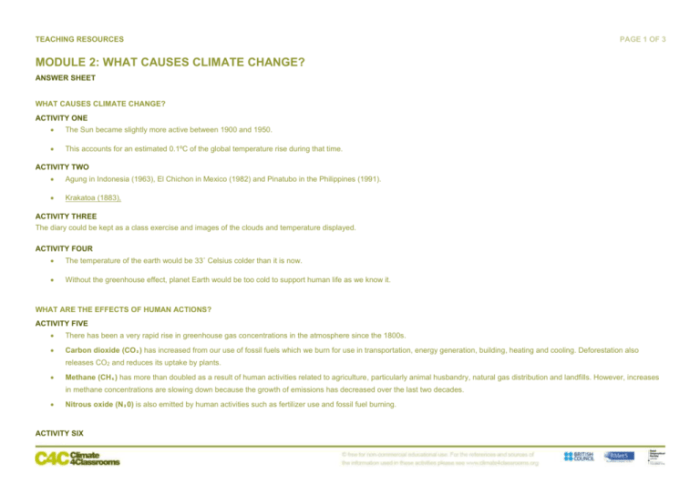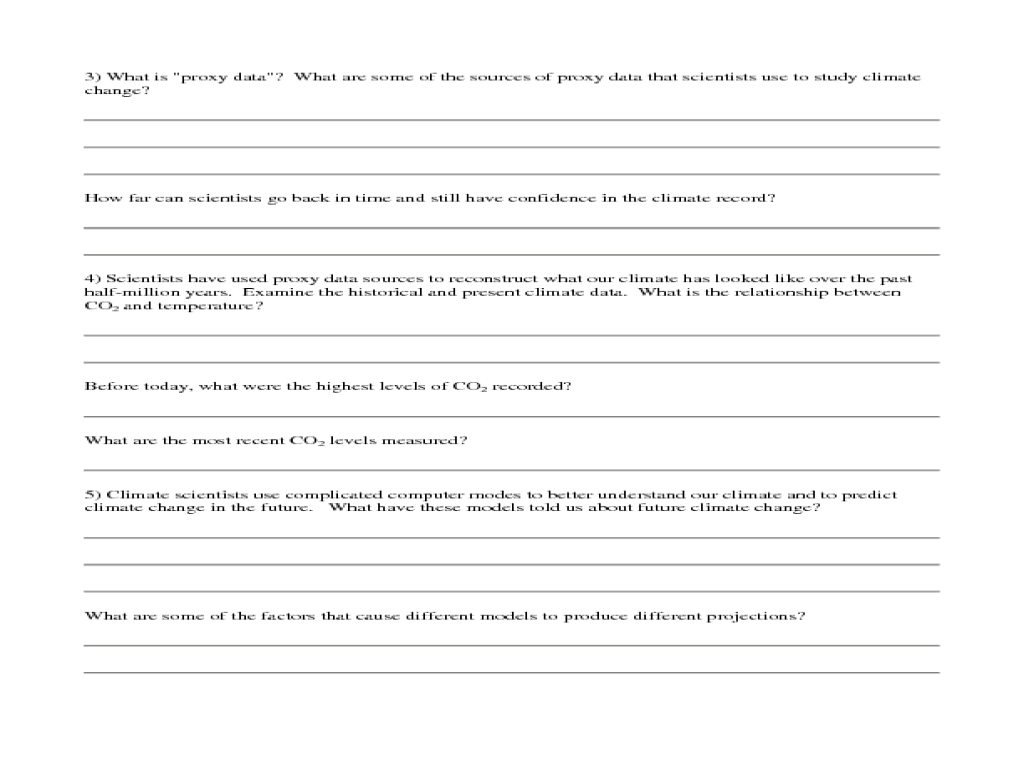Climate change webquest answer key – Climate change is one of the most pressing issues facing our planet today. This webquest answer key provides a comprehensive overview of the topic, covering definitions, impacts, mitigation, adaptation, scientific evidence, international cooperation, and education.
The content of the second paragraph that provides descriptive and clear information about the topic
Definitions and Concepts

Climate change refers to the long-term alterations in temperature and typical weather patterns in a place. These changes may be natural, such as through variations in solar radiation or volcanic eruptions, or they may be caused by human activities, primarily the burning of fossil fuels, which release greenhouse gases into the atmosphere.
Examples of climate change manifestations include rising sea levels, changes in precipitation patterns, more frequent and intense extreme weather events, and shifts in plant and animal distributions.
Weather refers to the short-term state of the atmosphere in a particular place, while climate refers to the average weather conditions over a longer period, typically 30 years or more.
Impacts of Climate Change
Environmental Impacts
- Rising sea levels, leading to coastal erosion, flooding, and salinization of freshwater sources.
- Changes in precipitation patterns, resulting in droughts, floods, and altered water availability.
- More frequent and intense extreme weather events, such as hurricanes, heatwaves, and wildfires.
- Biodiversity loss due to habitat changes, species extinction, and disruption of ecological interactions.
Human Impacts, Climate change webquest answer key
- Threats to food security due to changes in crop yields and livestock production.
- Health risks from heat-related illnesses, respiratory problems, and waterborne diseases.
- Economic impacts, including damage to infrastructure, disruption of transportation and supply chains, and loss of tourism revenue.
- Disproportionate impacts on vulnerable populations and regions, such as low-income communities, coastal areas, and indigenous peoples.
- Reducing greenhouse gas emissions by transitioning to renewable energy sources, improving energy efficiency, and implementing carbon capture and storage technologies.
- Promoting sustainable land use practices, such as reforestation, agroforestry, and conservation tillage.
- Investing in research and development of low-carbon technologies and solutions.
- Building seawalls, levees, and other infrastructure to protect coastal areas from rising sea levels.
- Developing drought-resistant crops and implementing water conservation measures.
- Improving early warning systems and disaster preparedness plans for extreme weather events.
- Observed increases in global average temperatures.
- Changes in precipitation patterns and the frequency and intensity of extreme weather events.
- Rising sea levels.
- Melting of glaciers and ice caps.
Mitigation and Adaptation: Climate Change Webquest Answer Key
Mitigation Strategies
Adaptation Measures
Examples of successful mitigation and adaptation initiatives include the Paris Agreement, the Green Climate Fund, and community-based adaptation projects in vulnerable regions.
Climate Change Science

Overwhelming scientific evidence supports the reality and urgency of climate change. This evidence includes:
Scientific models play a crucial role in predicting future climate scenarios based on different emission pathways. However, uncertainties and challenges remain in climate change science, such as the exact timing and magnitude of future impacts.
International Cooperation and Policy
International agreements and frameworks, such as the Paris Agreement, provide a global framework for addressing climate change.
National governments, businesses, and civil society organizations have key roles in implementing climate change policies. This includes setting emission reduction targets, promoting renewable energy, and investing in adaptation measures.
Challenges and opportunities exist for international cooperation on climate change, including the need for equitable burden-sharing, financial support for developing countries, and technology transfer.
Climate Change Education and Awareness
Educating the public about climate change is crucial for raising awareness, promoting understanding, and inspiring action.
Schools, media, and community organizations play vital roles in disseminating information about climate change, its impacts, and potential solutions.
Effective climate change education programs include hands-on activities, interactive simulations, and real-world examples that make the issue relatable and understandable.
Questions Often Asked
What is climate change?
Climate change refers to the long-term changes in the Earth’s climate system, which are primarily caused by human activities, especially the burning of fossil fuels.
What are the impacts of climate change?
Climate change is having a wide range of impacts on the environment, including rising sea levels, more extreme weather events, and biodiversity loss. It is also having significant impacts on human societies, such as food security, health, and economic growth.
What can be done to mitigate climate change?
There are a number of things that can be done to mitigate climate change, including reducing greenhouse gas emissions, promoting renewable energy sources, and improving energy efficiency.
What can be done to adapt to climate change?
There are also a number of things that can be done to adapt to the effects of climate change, such as building seawalls, improving agricultural practices, and developing early warning systems.